Module 4 The natural world Unit 1 Water 课件(共48张ppt)
文档属性
| 名称 | Module 4 The natural world Unit 1 Water 课件(共48张ppt) |
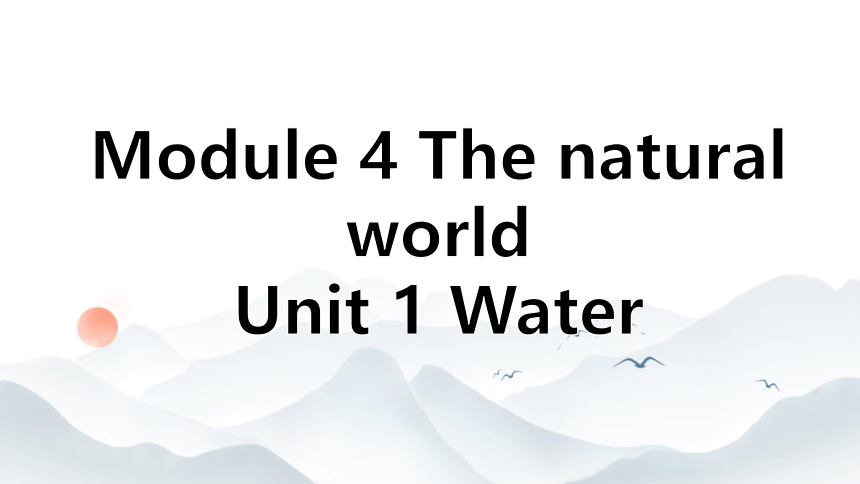
|
|
| 格式 | pptx | ||
| 文件大小 | 6.3MB | ||
| 资源类型 | 教案 | ||
| 版本资源 | 牛津上海版(试用本) | ||
| 科目 | 英语 | ||
| 更新时间 | 2020-09-27 00:00:00 | ||
图片预览

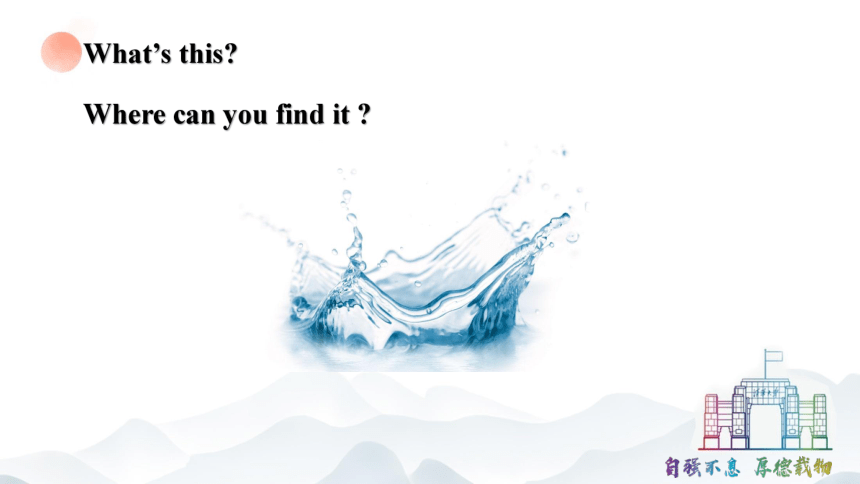
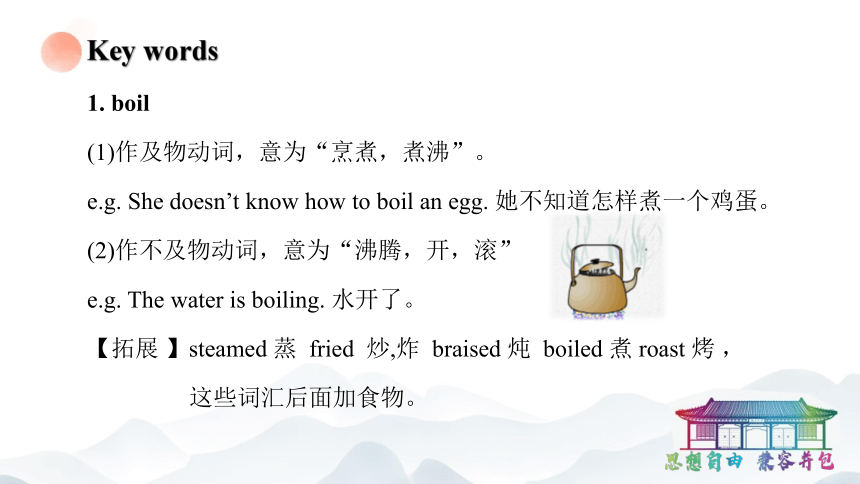
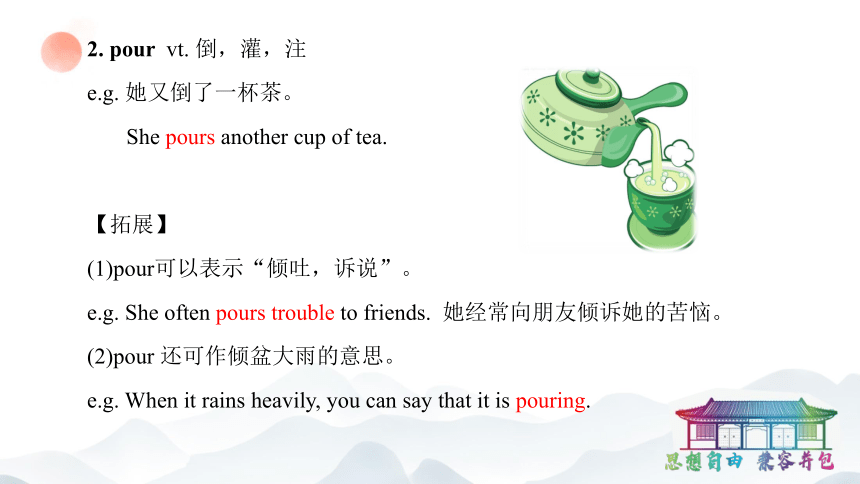
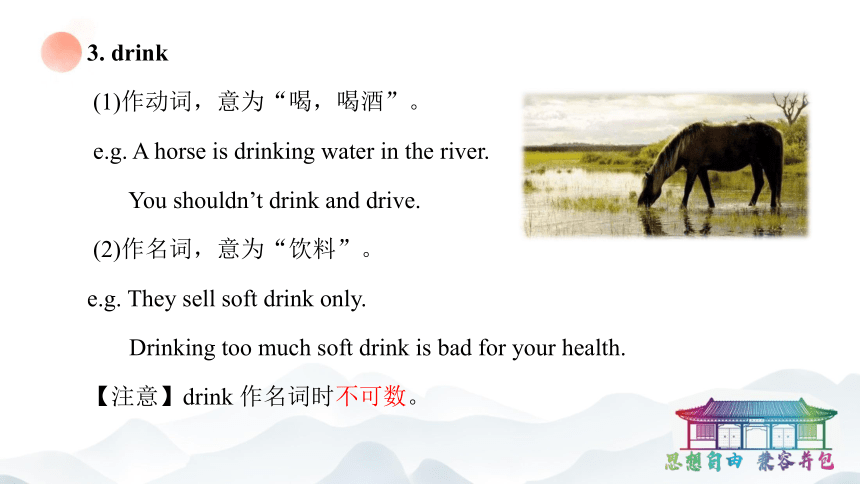
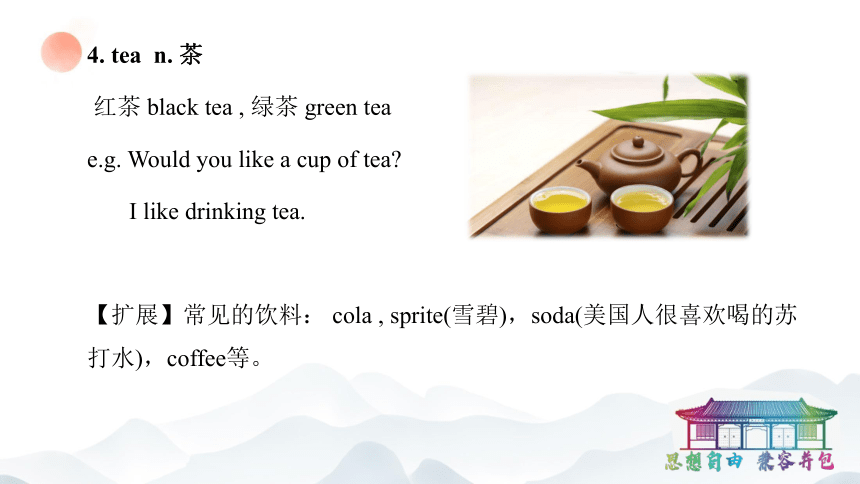




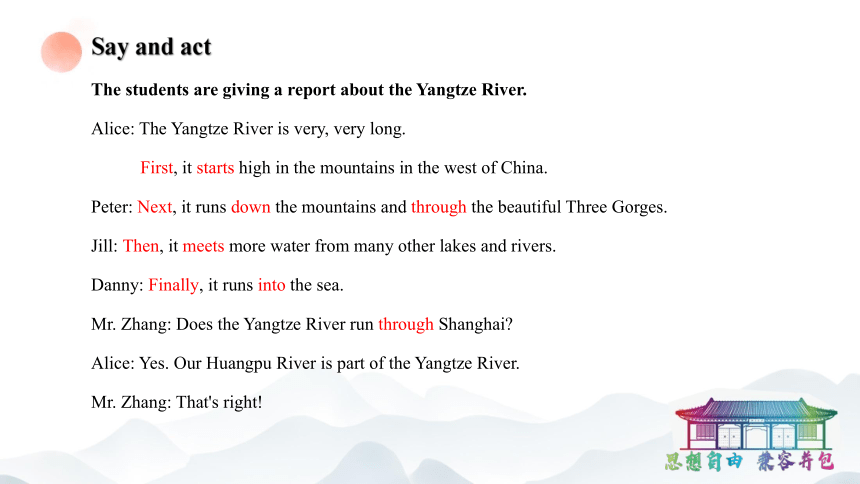
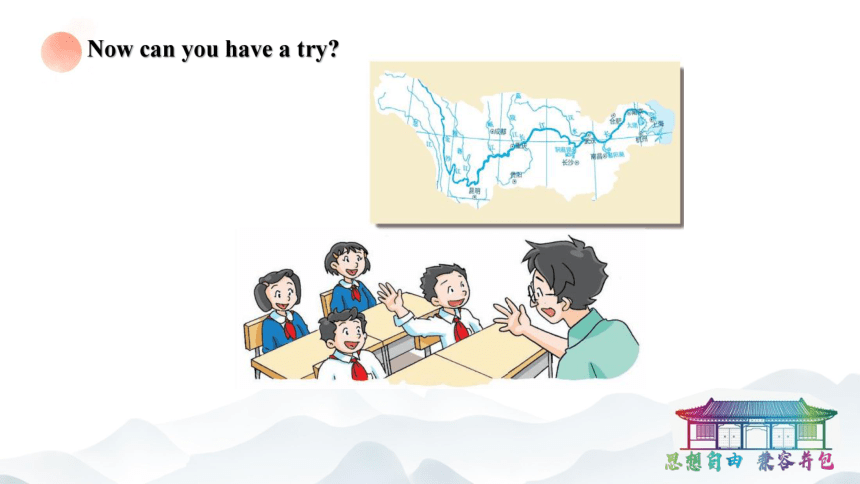
文档简介
Module 4 The natural world
Unit 1 Water
What’s this?
Where can you find it ?
Key words
1. boil
(1)作及物动词,意为“烹煮,煮沸”。
e.g. She doesn’t know how to boil an egg. 她不知道怎样煮一个鸡蛋。
(2)作不及物动词,意为“沸腾,开,滚”
e.g. The water is boiling. 水开了。
【拓展 】steamed 蒸 fried 炒,炸 braised 炖 boiled 煮 roast 烤 ,
这些词汇后面加食物。
2. pour vt. 倒,灌,注
e.g. 她又倒了一杯茶。
She pours another cup of tea.
【拓展】
(1)pour可以表示“倾吐,诉说”。
e.g. She often pours trouble to friends. 她经常向朋友倾诉她的苦恼。
(2)pour 还可作倾盆大雨的意思。
e.g. When it rains heavily, you can say that it is pouring.
3. drink
(1)作动词,意为“喝,喝酒”。
e.g. A horse is drinking water in the river.
You shouldn’t drink and drive.
(2)作名词,意为“饮料”。
e.g. They sell soft drink only.
Drinking too much soft drink is bad for your health.
【注意】drink 作名词时不可数。
4. tea n. 茶
红茶 black tea , 绿茶 green tea
e.g. Would you like a cup of tea?
I like drinking tea.
【扩展】常见的饮料: cola , sprite(雪碧),soda(美国人很喜欢喝的苏打水),coffee等。
Look and say
Do you know how to make tea?
First/Next/Then/Finally, ...
Kitty is in the kitchen with her grandma.
Kitty:What are you doing, Grandma?
Grandma:I'm making some tea. Would you like some?
Kitty:Yes, please. How do you make tea, Grandma?
Grandma:Well, first, we must boil the water.
Kitty:What's next?
Grandma:Next, we put some tea in the teapot. Then, we pour the hot water into the teapot.
Kitty:And finally?
Grandma:Finally, we pour the tea into the cups and drink the tea!
Kitty:Mmm, it tastes great!
Kitty is in the kitchen with her grandma.
Kitty:What are you doing, Grandma?
Grandma:I'm making some tea. Would you like some?
Kitty:Yes, please. How do you make tea, Grandma?
Grandma:Well, first, we must boil the water.
Kitty:What's next?
Grandma:Next, we put some tea in the teapot. Then, we pour the hot water into the teapot.
Kitty:And finally?
Grandma:Finally, we pour the tea into the cups and drink the tea!
Kitty:Mmm, it tastes great!
Now do you know how to make tea?
Say and act
The students are giving a report about the Yangtze River.
Alice: The Yangtze River is very, very long.
First, it starts high in the mountains in the west of China.
Peter: Next, it runs down the mountains and through the beautiful Three Gorges.
Jill: Then, it meets more water from many other lakes and rivers.
Danny: Finally, it runs into the sea.
Mr. Zhang: Does the Yangtze River run through Shanghai?
Alice: Yes. Our Huangpu River is part of the Yangtze River.
Mr. Zhang: That's right!
Now can you have a try?
Key structures
1. Would you like some? 你想来点茶吗?
本句中的Would you like+ sth. /to do sth.?表示建议。
e.g. Would you like some drinks? 你想要一些饮料吗?
I would like to drink some water. 我想喝一些水。
【注】would you like = want
在使用时比较委婉,通常希望得到对方的肯定回答,所以用some。
2. Mmm, it tastes great! 嗯嗯,好喝极了。
taste在本句中是系动词,意为“尝起来”。
e.g. The dish tastes very good. 这道菜好吃极了。
【拓展】具有类似用法的词还有:smell,look,hear,feel等。
e.g. The flower smells sweet. 这朵花闻起来很香。
It looks like a cat. 它看起来像一只猫。
3. The students are giving a report about the Yangtze River.
学生们正在就长江问题作报告。
the Yangtze River中必须加定冠词the。我们要注意the的用法。
本句中the用于专有名词前。如:
the Huanghe River黄河,the Great Wall长城,the Summer Palace颐和园
【扩展】定冠词 the 的详细用法。
1. 特指某(些)人或 某(些)物, 这是定冠词的基本用法。
e.g. The blue shirt is mine. 蓝衬衫是我的。
2. 指谈话双方都知道的人或事物。
e.g. Open the window, please. 请打开窗户。
3. 指上文已经提到的人或事物。
e.g. I have a car. The car is red. 我有一辆小汽车, 它是红色的。
4. 指世界上独一无二的事物.
e.g. Which is bigger, the sun or the earth? 哪一个大,太阳还是地球?
5. 用在乐器名称前。
e.g. She plays the piano every day. 她每天弹钢琴。
6. 用在表示海洋,河流,山脉,群岛及国家和党派等名词前。
e.g. the Black Sea 黑海,the Yangzi River 长江
Read a story
Look at the pictures. Do you know what they are about?
The journey of Little Water Drop
Read a story
The journey of Little Water Drop
Little Water Drop lives in the sea. It is raining. Many raindrops fall from the sky. ‘I really want to go up to the sky,’ says Little Water Drop.
The Sun shines and Little Water Drop gets hot. He rises up to the sky. It is cool there. Now he is in a cloud.
Little Water Drop flies over rivers and mountains. One day he sees some trees. ‘We are thirsty,’ say the trees.
Little Water Drop falls down to the ground. A tree drinks him. Now Little Water Drop is inside the tree.
Think and number
Little Water Drop falls down to the ground.
Little Water Drop is in the sea.
Little Water Drop is in a cloud.
Little Water Drop rises up to the sky.
1
2
3
4
【知识链接】
He rise up to the sky. 他升到天空中。
rise 是”上升,升起”的意思,是不及物动词,反义词为set.
e.g. The sun rises in the east and sets in the west.
太阳从东方升起,从西方落下。
The price of the vegetables is rising up.
蔬菜的价格正在上涨。
【知识链接】
First, get a glass of water and a piece of white paper.
首先,拿来一杯水和一张白纸。
一些不可数名词变复数需借助一些量词,如本句中的a glass of water 和 a piece of paper,要表达复数概念,须在量词上体现,e.g. two glass of water, three pieces of paper.
e.g. I drink two cups of tea. 我喝了两杯茶
He has three pieces of bread. 他吃了三片面包。
【扩展】
不可数名词没有复数形式,如果表示“一个”的概念,可用单位词:
a piece of news / information / advice / bread / paper / meat / coal
a bottle of ink, a grain of rice ,
常考不可数名词:information, weather, news, advice, fun等。
Look at the pictures.
Can you guess how to make a rainbow?
Next, take them near the window, into the sunlight.
First, get a glass of water and a piece of white paper.
Then, hold the glass of water above the paper.
What can you see?
It's a rainbow!
Learn the sounds
Learn the sounds
1. — that old lady?
— My English teacher.
A. Whose B. Who's C. What’s
答案:B
解析:句意-那个年长的女人是谁?我的英语老师。所以选择对who来提问。
2. —Mum, can I have juice, please?
—OK. Here you are.
A. some B. a C. any
答案:A
解析:句中juice为不可数名词,不能用a来修饰。又因句子表示婉转请求,希望得到对方肯定回答,所以用some来修饰。
3. The girl me is tall. I can't see the words on the blackboard.
A. beside B. in front of C. behind
答案:B
解析:根据句意,我看不到黑板上的单词,证明女孩在我的前面,所以选择词组in front of。
4. —Who a bicycle?
—Six boys a bicycle.
A. has; has B. have; have C. has; have
答案:C
解析:Who提问,默认为单数,所以选择has,答句主语为复数,所以选择have。
5. bags of corn does a bird need for dinner?
A. How many B. How much C. What
答案:A
解析:提问数量,bags为复数,所以选择how many提问。
6. the morning of March 12th, we usually plant trees.
A. In B. On C. At
答案:B
解析:对具体某一天的早上修饰,要使用介词on。
7. We pour the hot water the teapot.
A. with B. of C. into
答案:C
解析:根据句意,我们把热水倒进茶壶里,使用词组pour…into…
8. First, we must the water.
A. boil B. boiling C. boils
答案:A
解析:句中must为情态动词,后面要使用动词原形,所以选择boil。
一、根据要求改写句子
1. Ben eats dinner at 6:00 every evening. (改为否定句)
Ben dinner at 6:00 every evening.
2. Little water drop falls down to the ground. (改为一般疑问句)
little water drop to the ground?
doesn’t eat
Does fall down
3. Tom's father is reading a newspaper in the sitting room. (就画线部分提问)
Tom's father in the sitting room?
4. It tastes great. (就画线部分提问)
it ?
5. The cat is in front of the mouse. (换种说法,保持句意不变)
The mouse is the cat.
behind
What’s doing
How does taste
二、用所给词的适当形式填空。
1. It’s six now. The Whites ___________ (have) dinner in the dinning room.
2. -What ________ their father _________(do)?
-He ______ (work) in the zoo.
3. -How many _________ (lady) are there in the offices?
-There are three.
4. (there be) ____________ an old pen and two brushes in the box?
are having
does do
works
ladies
Is there
5. Mary, _________ (you) _________ (write) a letter to your sister now?
6. His uncle _________ (like) ________ (swim) in summer.
7. -Are these ____________ (waitress) dresses nice?
-Yes, they are.
8. -__________ (who) blue bicycle is this?
-It’s Peter’s.
Whose
are writing
likes swimming
waitresses’
三、连词成句。
1. running is is mouse the afraid the yes cat of it
_________________________________________________________
2. sour taste with tongue grapes the your
_________________________________________________________
Is the mouse afraid of the running cat? Yes, it is.
Taste the sour grapes with your tongue.
3. can’t but a touch blind can and man see he smell
__________________________________________________________
4. of your box chocolates feel a put box the can in you hands
__________________________________________________________
5. big a the in hole has big super dog bone
__________________________________________________________
A big super dog has a big bone in hole.
?
A blind man can’t see but he can smell an touch.
You can feel a bow of the chocolates in your hand.
一、 Read and write. (根据所给的词,完成短文)
Today is Sunday. It is a busy day. We (be) all at home. Look, my mother (do) some cooking. She always (cook) for us. We like (eat) chicken, meat and vegetables. My father_____________(clean) his new car. He often (drive) his car to work. Oh, listen! What's that noise? My brother (sing) a song in his room. He likes (sing) very much. What (be) I ____________(do)? I_____________(clean) my room. Look, it's clean now. We are busy but we are happy.
二、Read and answer.
It is Sunday afternoon. Mary's family are all at home. Her father, Mr. Green is sitting in a chair near the window. He's reading today's newspaper. Every day he reads newspapers in the same place. Mary is in her room. She is not doing her homework. She is listening to the radio. Peter and John, Mary's little brothers, are not playing now. They are learning to ride their new bicycles. Peter's new bicycle is black and John's is red. Mrs. Green, Mary's mother is in the garden. She is watering the flowers. There are a lot of nice flowers in the small garden. Kate, Mary's big sister, is helping her mother. She always helps her mother with the housework. It's a happy family.
1.How many people are there in Mary's family?
___________________________________________________________
2.What does Mr. Green do every day?
___________________________________________________________
3.What is Kate doing?
___________________________________________________________
4.Who has a red bicycle?
___________________________________________________________
5.Is Peter's mother planting the trees?
___________________________________________________________
Keys
一、1. are 2. is doing 3. cooks 4. to eat/eating 5. is cleaning
6. drives 7. is singing 8. singing 9. am . . . doing 10. am cleaning
二、
1. There are six.
2. He reads newspapers every day.
3. She is helping her mother with the housework.
4. John.
5. No, she isn't.
Unit 1 Water
What’s this?
Where can you find it ?
Key words
1. boil
(1)作及物动词,意为“烹煮,煮沸”。
e.g. She doesn’t know how to boil an egg. 她不知道怎样煮一个鸡蛋。
(2)作不及物动词,意为“沸腾,开,滚”
e.g. The water is boiling. 水开了。
【拓展 】steamed 蒸 fried 炒,炸 braised 炖 boiled 煮 roast 烤 ,
这些词汇后面加食物。
2. pour vt. 倒,灌,注
e.g. 她又倒了一杯茶。
She pours another cup of tea.
【拓展】
(1)pour可以表示“倾吐,诉说”。
e.g. She often pours trouble to friends. 她经常向朋友倾诉她的苦恼。
(2)pour 还可作倾盆大雨的意思。
e.g. When it rains heavily, you can say that it is pouring.
3. drink
(1)作动词,意为“喝,喝酒”。
e.g. A horse is drinking water in the river.
You shouldn’t drink and drive.
(2)作名词,意为“饮料”。
e.g. They sell soft drink only.
Drinking too much soft drink is bad for your health.
【注意】drink 作名词时不可数。
4. tea n. 茶
红茶 black tea , 绿茶 green tea
e.g. Would you like a cup of tea?
I like drinking tea.
【扩展】常见的饮料: cola , sprite(雪碧),soda(美国人很喜欢喝的苏打水),coffee等。
Look and say
Do you know how to make tea?
First/Next/Then/Finally, ...
Kitty is in the kitchen with her grandma.
Kitty:What are you doing, Grandma?
Grandma:I'm making some tea. Would you like some?
Kitty:Yes, please. How do you make tea, Grandma?
Grandma:Well, first, we must boil the water.
Kitty:What's next?
Grandma:Next, we put some tea in the teapot. Then, we pour the hot water into the teapot.
Kitty:And finally?
Grandma:Finally, we pour the tea into the cups and drink the tea!
Kitty:Mmm, it tastes great!
Kitty is in the kitchen with her grandma.
Kitty:What are you doing, Grandma?
Grandma:I'm making some tea. Would you like some?
Kitty:Yes, please. How do you make tea, Grandma?
Grandma:Well, first, we must boil the water.
Kitty:What's next?
Grandma:Next, we put some tea in the teapot. Then, we pour the hot water into the teapot.
Kitty:And finally?
Grandma:Finally, we pour the tea into the cups and drink the tea!
Kitty:Mmm, it tastes great!
Now do you know how to make tea?
Say and act
The students are giving a report about the Yangtze River.
Alice: The Yangtze River is very, very long.
First, it starts high in the mountains in the west of China.
Peter: Next, it runs down the mountains and through the beautiful Three Gorges.
Jill: Then, it meets more water from many other lakes and rivers.
Danny: Finally, it runs into the sea.
Mr. Zhang: Does the Yangtze River run through Shanghai?
Alice: Yes. Our Huangpu River is part of the Yangtze River.
Mr. Zhang: That's right!
Now can you have a try?
Key structures
1. Would you like some? 你想来点茶吗?
本句中的Would you like+ sth. /to do sth.?表示建议。
e.g. Would you like some drinks? 你想要一些饮料吗?
I would like to drink some water. 我想喝一些水。
【注】would you like = want
在使用时比较委婉,通常希望得到对方的肯定回答,所以用some。
2. Mmm, it tastes great! 嗯嗯,好喝极了。
taste在本句中是系动词,意为“尝起来”。
e.g. The dish tastes very good. 这道菜好吃极了。
【拓展】具有类似用法的词还有:smell,look,hear,feel等。
e.g. The flower smells sweet. 这朵花闻起来很香。
It looks like a cat. 它看起来像一只猫。
3. The students are giving a report about the Yangtze River.
学生们正在就长江问题作报告。
the Yangtze River中必须加定冠词the。我们要注意the的用法。
本句中the用于专有名词前。如:
the Huanghe River黄河,the Great Wall长城,the Summer Palace颐和园
【扩展】定冠词 the 的详细用法。
1. 特指某(些)人或 某(些)物, 这是定冠词的基本用法。
e.g. The blue shirt is mine. 蓝衬衫是我的。
2. 指谈话双方都知道的人或事物。
e.g. Open the window, please. 请打开窗户。
3. 指上文已经提到的人或事物。
e.g. I have a car. The car is red. 我有一辆小汽车, 它是红色的。
4. 指世界上独一无二的事物.
e.g. Which is bigger, the sun or the earth? 哪一个大,太阳还是地球?
5. 用在乐器名称前。
e.g. She plays the piano every day. 她每天弹钢琴。
6. 用在表示海洋,河流,山脉,群岛及国家和党派等名词前。
e.g. the Black Sea 黑海,the Yangzi River 长江
Read a story
Look at the pictures. Do you know what they are about?
The journey of Little Water Drop
Read a story
The journey of Little Water Drop
Little Water Drop lives in the sea. It is raining. Many raindrops fall from the sky. ‘I really want to go up to the sky,’ says Little Water Drop.
The Sun shines and Little Water Drop gets hot. He rises up to the sky. It is cool there. Now he is in a cloud.
Little Water Drop flies over rivers and mountains. One day he sees some trees. ‘We are thirsty,’ say the trees.
Little Water Drop falls down to the ground. A tree drinks him. Now Little Water Drop is inside the tree.
Think and number
Little Water Drop falls down to the ground.
Little Water Drop is in the sea.
Little Water Drop is in a cloud.
Little Water Drop rises up to the sky.
1
2
3
4
【知识链接】
He rise up to the sky. 他升到天空中。
rise 是”上升,升起”的意思,是不及物动词,反义词为set.
e.g. The sun rises in the east and sets in the west.
太阳从东方升起,从西方落下。
The price of the vegetables is rising up.
蔬菜的价格正在上涨。
【知识链接】
First, get a glass of water and a piece of white paper.
首先,拿来一杯水和一张白纸。
一些不可数名词变复数需借助一些量词,如本句中的a glass of water 和 a piece of paper,要表达复数概念,须在量词上体现,e.g. two glass of water, three pieces of paper.
e.g. I drink two cups of tea. 我喝了两杯茶
He has three pieces of bread. 他吃了三片面包。
【扩展】
不可数名词没有复数形式,如果表示“一个”的概念,可用单位词:
a piece of news / information / advice / bread / paper / meat / coal
a bottle of ink, a grain of rice ,
常考不可数名词:information, weather, news, advice, fun等。
Look at the pictures.
Can you guess how to make a rainbow?
Next, take them near the window, into the sunlight.
First, get a glass of water and a piece of white paper.
Then, hold the glass of water above the paper.
What can you see?
It's a rainbow!
Learn the sounds
Learn the sounds
1. — that old lady?
— My English teacher.
A. Whose B. Who's C. What’s
答案:B
解析:句意-那个年长的女人是谁?我的英语老师。所以选择对who来提问。
2. —Mum, can I have juice, please?
—OK. Here you are.
A. some B. a C. any
答案:A
解析:句中juice为不可数名词,不能用a来修饰。又因句子表示婉转请求,希望得到对方肯定回答,所以用some来修饰。
3. The girl me is tall. I can't see the words on the blackboard.
A. beside B. in front of C. behind
答案:B
解析:根据句意,我看不到黑板上的单词,证明女孩在我的前面,所以选择词组in front of。
4. —Who a bicycle?
—Six boys a bicycle.
A. has; has B. have; have C. has; have
答案:C
解析:Who提问,默认为单数,所以选择has,答句主语为复数,所以选择have。
5. bags of corn does a bird need for dinner?
A. How many B. How much C. What
答案:A
解析:提问数量,bags为复数,所以选择how many提问。
6. the morning of March 12th, we usually plant trees.
A. In B. On C. At
答案:B
解析:对具体某一天的早上修饰,要使用介词on。
7. We pour the hot water the teapot.
A. with B. of C. into
答案:C
解析:根据句意,我们把热水倒进茶壶里,使用词组pour…into…
8. First, we must the water.
A. boil B. boiling C. boils
答案:A
解析:句中must为情态动词,后面要使用动词原形,所以选择boil。
一、根据要求改写句子
1. Ben eats dinner at 6:00 every evening. (改为否定句)
Ben dinner at 6:00 every evening.
2. Little water drop falls down to the ground. (改为一般疑问句)
little water drop to the ground?
doesn’t eat
Does fall down
3. Tom's father is reading a newspaper in the sitting room. (就画线部分提问)
Tom's father in the sitting room?
4. It tastes great. (就画线部分提问)
it ?
5. The cat is in front of the mouse. (换种说法,保持句意不变)
The mouse is the cat.
behind
What’s doing
How does taste
二、用所给词的适当形式填空。
1. It’s six now. The Whites ___________ (have) dinner in the dinning room.
2. -What ________ their father _________(do)?
-He ______ (work) in the zoo.
3. -How many _________ (lady) are there in the offices?
-There are three.
4. (there be) ____________ an old pen and two brushes in the box?
are having
does do
works
ladies
Is there
5. Mary, _________ (you) _________ (write) a letter to your sister now?
6. His uncle _________ (like) ________ (swim) in summer.
7. -Are these ____________ (waitress) dresses nice?
-Yes, they are.
8. -__________ (who) blue bicycle is this?
-It’s Peter’s.
Whose
are writing
likes swimming
waitresses’
三、连词成句。
1. running is is mouse the afraid the yes cat of it
_________________________________________________________
2. sour taste with tongue grapes the your
_________________________________________________________
Is the mouse afraid of the running cat? Yes, it is.
Taste the sour grapes with your tongue.
3. can’t but a touch blind can and man see he smell
__________________________________________________________
4. of your box chocolates feel a put box the can in you hands
__________________________________________________________
5. big a the in hole has big super dog bone
__________________________________________________________
A big super dog has a big bone in hole.
?
A blind man can’t see but he can smell an touch.
You can feel a bow of the chocolates in your hand.
一、 Read and write. (根据所给的词,完成短文)
Today is Sunday. It is a busy day. We (be) all at home. Look, my mother (do) some cooking. She always (cook) for us. We like (eat) chicken, meat and vegetables. My father_____________(clean) his new car. He often (drive) his car to work. Oh, listen! What's that noise? My brother (sing) a song in his room. He likes (sing) very much. What (be) I ____________(do)? I_____________(clean) my room. Look, it's clean now. We are busy but we are happy.
二、Read and answer.
It is Sunday afternoon. Mary's family are all at home. Her father, Mr. Green is sitting in a chair near the window. He's reading today's newspaper. Every day he reads newspapers in the same place. Mary is in her room. She is not doing her homework. She is listening to the radio. Peter and John, Mary's little brothers, are not playing now. They are learning to ride their new bicycles. Peter's new bicycle is black and John's is red. Mrs. Green, Mary's mother is in the garden. She is watering the flowers. There are a lot of nice flowers in the small garden. Kate, Mary's big sister, is helping her mother. She always helps her mother with the housework. It's a happy family.
1.How many people are there in Mary's family?
___________________________________________________________
2.What does Mr. Green do every day?
___________________________________________________________
3.What is Kate doing?
___________________________________________________________
4.Who has a red bicycle?
___________________________________________________________
5.Is Peter's mother planting the trees?
___________________________________________________________
Keys
一、1. are 2. is doing 3. cooks 4. to eat/eating 5. is cleaning
6. drives 7. is singing 8. singing 9. am . . . doing 10. am cleaning
二、
1. There are six.
2. He reads newspapers every day.
3. She is helping her mother with the housework.
4. John.
5. No, she isn't.
同课章节目录
- Module 1 Getting to know you
- Unit 1 My birthday
- Unit 2 My way to school
- Unit 3 My future
- Module 2 Me, my family and friends
- Unit 1 Grandparents
- Unit 2 Friends
- Unit 3 Moving home
- Module 3 Places and activities
- Unit 1 Around the city
- Unit 2 Buying new clothes
- Unit 3 Seeing the docto
- Module 4 The natural world
- Unit 1 Wate
- Unit 2 Wind
- Unit 3 Fire
